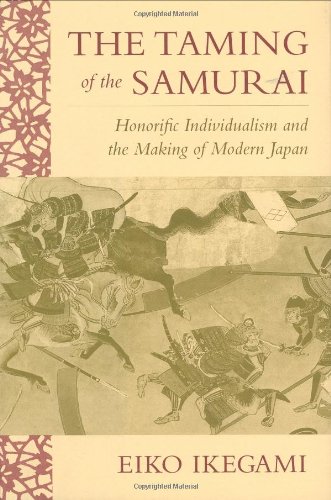Articoli correlati a The Taming of the Samurai: Honorific Individualism...

Sinossi
This book demonstrates how Japan's so-called harmonious collective culture is paradoxically connected with a history of conflict. Ikegami contends that contemporary Japanese culture is based upon two remarkably complementary ingredients, honorable competition and honorable collaboration. The historical roots of this situation can be found in the process of state formation, along very different lines from that seen in Europe at around the same time. The solution that emerged out of the turbulent beginnings of the Tokugawa state was a transformation of the samurai into a hereditary class of vassal-bureaucrats, a solution that would have many unexpected ramifications for subsequent centuries.
Le informazioni nella sezione "Riassunto" possono far riferimento a edizioni diverse di questo titolo.
Informazioni sull?autore
Eiko Ikegami is Associate Professor of Sociology, Yale University.
Le informazioni nella sezione "Su questo libro" possono far riferimento a edizioni diverse di questo titolo.
Compra usato
Condizioni: molto buonoEUR 9,36 per la spedizione da U.S.A. a Italia
Destinazione, tempi e costiRisultati della ricerca per The Taming of the Samurai: Honorific Individualism...
The Taming of the Samurai: Honorific Individualism and the Making of Modern Japan
Da: ThriftBooks-Atlanta, AUSTELL, GA, U.S.A.
Hardcover. Condizione: Very Good. No Jacket. May have limited writing in cover pages. Pages are unmarked. ~ ThriftBooks: Read More, Spend Less 1.45. Codice articolo G0674868080I4N00
Quantità: 1 disponibili
The Taming of the Samurai : Honorific Individualism & the Making of Modern Japan
Da: Joseph Burridge Books, Dagenham, Regno Unito
Hardcover. Condizione: Fine. Condizione sovraccoperta: Fine. 1st Edition. x, 428 pages : illustrations ; 24 cm. Contents: I.A Sociological Approach. 1. Honor, State Formation, and Social Theories II. Origins in Violence. 2. The Coming of the Samurai: Violence and Culture in the Ancient World. 3. Vassalage and Honor. 4. The Rite of Honorable Death: Warfare and the Samurai Sensibility III. Disintegration and Reorganization. 5. Social Reorganization in the Late Medieval Period. 6. A Society Organized for War IV. The Paradoxical Nature of Tokugawa State Formation. 7. Tokugawa State Formation. 8. An Integrated Yet Decentralized State Structure. 9. The Tokugawa Neo-Feudal State: A Comparative Evaluation V. Honor and Violence in Transformation. 10. Honor or Order: The State and Samurai Self-Determinism. 11. The Vendetta of the Forty-seven Samurai. 12. Proceduralization of Honor VI. Honor Polarization in Vassalic Bureaucracy. 13. State-Centered Honor and Vassalic Bureaucracy. 14. Hagakure: The Cult of Death and Honorific Individuality. 15. Confucian and Post-Confucian Samurai VII. Honorific individualism and honorific collectivism. 16. Themes of Control and Change Epilogue: Honor and Identity. Codice articolo ger331
Quantità: 1 disponibili
The Taming of the Samurai: Honorific Individualism and the Making of Modern Japan
Da: Moe's Books, Berkeley, CA, U.S.A.
Hard Cover. Condizione: Very good. Condizione sovraccoperta: Good. Jacket is lightly soiled and is lightly bumped at top corners. Small ink stamp at bottom left corner of front end leaf. Inside is otherwise clean and unmarked. Codice articolo 1132462
Quantità: 1 disponibili
The Taming Of The Samurai : Honorific Individualism and the Making of Modern Japan
Da: Jorge Welsh Books, Lisboa, Portogallo
Hardcover. Condizione: Very Good. Dust Jacket Included. English text.; Hardcover (with dust jacket); 17 x 24.5 cm.; 0.78 Kg.; 428 pages.; Used with signs of wear, namely on the outside text block. Interior as new. Signs of wear on the dust jacket that is now protected with a clearcover.; Modern Japan offers us a view of a highly developed society with its own internal logic. Eiko Ikegami makes this logic accessible to us through a sweeping investigation into the roots of Japanese organizational structures. She accomplishes this by focusing on the diverse roles that the samurai have played in Japanese history. From their rise in ancient Japan, through their dominance as warrior lords in the medieval period, and their subsequent transformation to quasi-bureaucrats at the beginning of the Tokugawa era, the samurai held center stage in Japan until their abolishment after the opening up of Japan in the mid-nineteenth century. This book demonstrates how Japan's so-called harmonious collective culture is paradoxically connected with a history of conflict. Ikegami contends that contemporary Japanese culture is based upon two remarkably complementary ingredients, honorable competition and honorable collaboration. The historical roots of this situation can be found in the process of state formation, along very different lines from that seen in Europe at around the same time. The solution that emerged out of the turbulent beginnings of the Tokugawa state was a transformation of the samurai into a hereditary class of vassal-bureaucrats, a solution that would have many unexpected ramifications for subsequent centuries. Ikegami's approach, while sociological, draws on anthropological and historical methods to provide an answer to the question of how the Japanese managed to achieve modernity without traveling the route taken by Western countries. The result is a work of enormous depth and sensitivity that will facilitate a better understanding of, and appreciation for, Japanese society. Codice articolo 712B
Quantità: 1 disponibili
THE TAMING OF THE SAMURAI: HONORIFIC INDIVIDUALISM AND THE MAKING OF MODERN JAPAN
Da: Rare Book Cellar, Pomona, NY, U.S.A.
Hardcover. First Edition; First Printing. Very Good+ in a Very Good+ dust jacket. 1/2 inch closed tear on top front panel. ; 6.75 X 1 X 9.75 inches; 440 pages. Codice articolo 306332
Quantità: 1 disponibili
The Taming of the Samurai: Honorific Individualism and the Making of Modern Japan
Da: Open Books, Chicago, IL, U.S.A.
hardcover. Condizione: Very Good. Open Books is a nonprofit social venture that provides literacy experiences for thousands of readers each year through inspiring programs and creative capitalization of books. Codice articolo mon0000778602
Quantità: 1 disponibili

